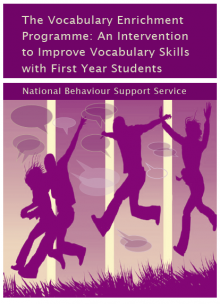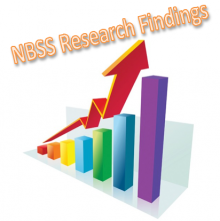Introduction
Supporting and developing the language and literacy skills necessary to engage effectively in all aspects of school and home life is integral to the work undertaken to support students in NBSS partner schools. Research highlights how behavioural and academic problems exert reciprocal influences on one another (McEvoy & Welker, 2000; McIntosh et al., 2007). The research points to the importance of recognising the links between academic and behaviour difficulties and coordinating systems for prevention and intervention in both areas (Bulotsky-Shearer & Fantuzzo, 2011; Byrne & Smyth, 2010; Miles & Stipek, 2006; Trzeniewski et al., 2006; Valiente et al., 2010).
Speech, Language and Communication Skills
Speech, language and communication skills are an integral part of literacy. Literacy includes ‘the capacity to read, understand and critically appreciate various forms of communication including spoken language, printed text, broadcast media, and digital media’ (DES, 2011: p.8). This highlights the integral nature of oral language development in both literacy and numeracy. Development of vocabulary skills is inherent to both oral and written language development. Students aged 12-17 years are exposed to 10,000 new words from textbooks alone over their years at post-primary school (Clark, 2003). The transition to post-primary school requires students to have a high level of vocabulary knowledge in order to communicate efficiently in the academic context (Wilson et al., 2010) and students with limited vocabulary often find this a significant barrier to their learning.
International evidence highlights that vocabulary difficulties are more prevalent for students in areas of socioeconomic disadvantage (Sage, 2005; Spencer et al., 2012) and that vocabulary skills can be developed and modified as a result of intervention (Nash & Snowling, 2006; Parsons et al., 2005). Within Ireland there is a national focus on oral language and literacy development within the new Junior Cycle Key Skills and Junior Cycle English programme. For these reasons, combined with the positive data from the NBSS Vocabulary Enrichment Programme (VEP, Joffe, 2011) pilot project, the NBSS introduced an adapted version of the VEP programme to six post-primary NBSS partner schools as a Level 1 whole school support (the VEP programme was originally developed for use with small groups of students with identified language impairments. Thus an adapted version of the VEP was developed by the NBSS senior speech and language therapist to fit in with whole class teaching).
Overview
The adapted Vocabulary Enrichment Programme (VEP) is a school based, whole class intervention that supports development of oral vocabulary skills in adolescents. The research project aimed to evaluate if the programme would be successful in improving the oral vocabulary skills of first year students in Irish post-primary schools in areas of socioeconomic disadvantage. Four hundred and seven first year students from six NBSS partner schools participated with three hundred and nineteen students from four schools receiving the intervention in September 2013 and the remaining eighty-eight students from two schools acting as controls and receiving the intervention later in the same academic year.
The programme comprises of twelve sessions, each taking two 40 minute classes, strongly based on the content of sessions 1-10 of the ‘Vocabulary Enrichment Programme’(Joffe, 2011), with two revision sessions added. The programme is designed to be delivered over 12 weeks but some classes took up to 16 weeks to complete. It targets the development of a combination of vocabulary learning strategies, including contextual strategies, morphological analysis strategies and direct instruction. These strategies enable students to learn to independently interpret new words.
Findings
All students were assessed pre-intervention and post-intervention on standardised measures of oral language. Teachers were comprehensively trained by, and provided with weekly support from, the NBSS senior speech and language therapist (SLT). The programme was delivered in regular English or literacy classes twice a week for 12 weeks.
Analysis of students’ standard scores at pre-intervention stage highlighted that approximately 56.6% of students presented with difficulties in all standardised oral vocabulary assessments. This illustrates the high level of oral vocabulary difficulties adolescents from areas of socioeconomic disadvantage present with and is consistent with findings from international research. These scores strongly indicate the need for whole school approaches to vocabulary learning for all students that include a focus on semantic language skills, such as the adapted VEP intervention, as well as more integrated additional supports for those who need it.
Quantitative Findings
Quantitative findings demonstrate significant improvement on all five raw score vocabulary measures for the intervention group more than the control group (word classes receptive (p=0.028); word classes expressive (p<0.001); word definitions (p=0.013) word associations (p=0.013); BPVS-3 (p<0.001)). This means that students improved their vocabulary knowledge and skills as a result of completing the adapted VEP’ to This means that students improved their vocabulary knowledge and skills as a result of completing the adapted VEP. Inaddition, these improvements were made on standard scores in three of the four standardised tests more than the control group (word classes receptive(p=0.026*); word classes expressive (p<0.001*); BPVS-3 (p<0.009*)). Improvement on standardised tests of language indicates that this intervention, targeting vocabulary strategies and skills, improves students’ overall oral receptive and expressive language skills.
Qualitative Findings
Qualitative findings from interviews with eight teachers, from two of the intervention schools, further reinforce the merits of this intervention. Teachers reported that the programme is a novel, useful and necessary intervention which develops students’ skills and strategies and fills a gap in the curriculum. As well as improving vocabulary skills, teachers also highlighted other impacts such as improved student confidence and motivation. They described the adapted VEP as a flexible programme that highlights students’ abilities in understanding and using language. The teachers indicated that the programme could be run at whole class, small group and individual student level.
Although time for preparation and delivery, as well as the amount of content to cover, emerged as common challenges, these did not impede the improvements students made on vocabulary measures. This may have been the result of some schools using a more flexible intervention delivery time of 14-16 weeks. Teachers reported they felt team teaching was extremely useful in supporting the level of interactive group and peer work utilised within the programme but that this approach needed to be consistent with at least one teacher being a constant or lead in both class periods.
Comprehensive training combined with regular monitoring and flexible support emerged as important factors in the success of the intervention. Teachers reported that working collaboratively with the SLT on a weekly basis supported reduction of uncertainty and stress. Teachers also identified the importance of all staff in a school being aware of the intervention programme and the skills and strategies that are being taught within it.
Conclusion
Findings from this research support the delivery of the adapted VEP as a whole class intervention to support and develop students’ underlying vocabulary skills. These skills improved significantly as a result of students receiving the programme. However to ensure sustainability, it was found that these skills and strategies need to be re-addressed following the completion of the programme, in multiple classes, across all curricular areas.



